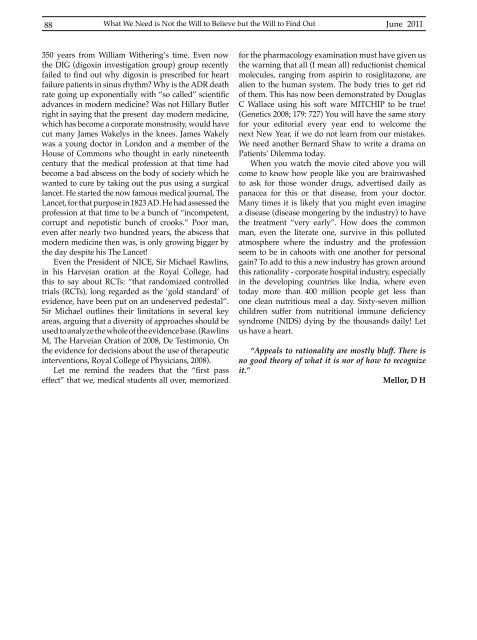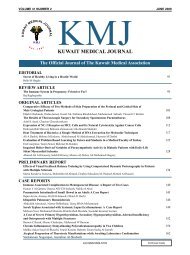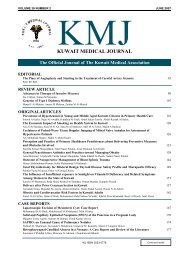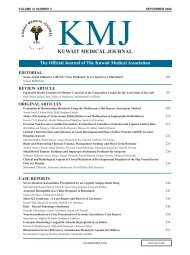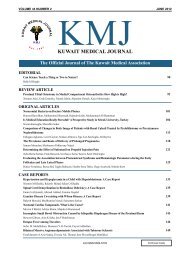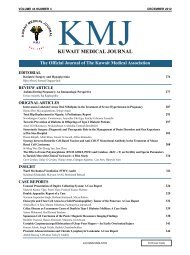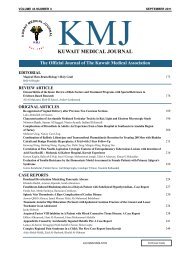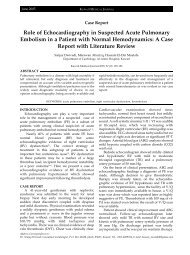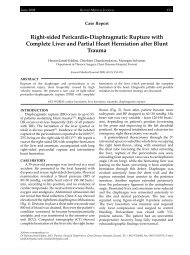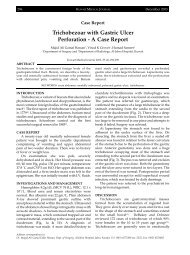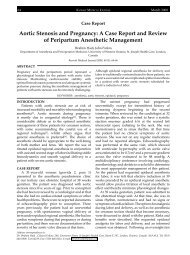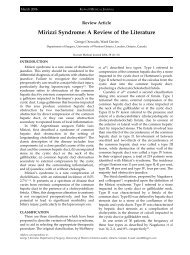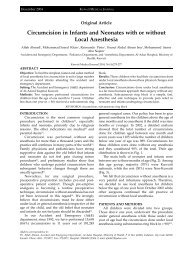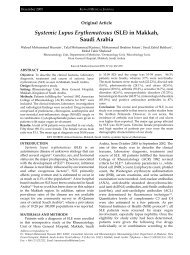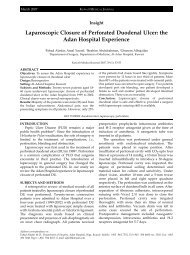Vol 43 # 2 June 2011 - Kma.org.kw
Vol 43 # 2 June 2011 - Kma.org.kw
Vol 43 # 2 June 2011 - Kma.org.kw
You also want an ePaper? Increase the reach of your titles
YUMPU automatically turns print PDFs into web optimized ePapers that Google loves.
88 What We Need is Not the Will to Believe but the Will to Find Out<br />
<strong>June</strong> <strong>2011</strong><br />
350 years from William Withering’s time. Even now<br />
the DIG (digoxin investigation group) group recently<br />
failed to find out why digoxin is prescribed for heart<br />
failure patients in sinus rhythm Why is the ADR death<br />
rate going up exponentially with “so called” scientific<br />
advances in modern medicine Was not Hillary Butler<br />
right in saying that the present day modern medicine,<br />
which has become a corporate monstrosity, would have<br />
cut many James Wakelys in the knees. James Wakely<br />
was a young doctor in London and a member of the<br />
House of Commons who thought in early nineteenth<br />
century that the medical profession at that time had<br />
become a bad abscess on the body of society which he<br />
wanted to cure by taking out the pus using a surgical<br />
lancet. He started the now famous medical journal, The<br />
Lancet, for that purpose in 1823 AD. He had assessed the<br />
profession at that time to be a bunch of “incompetent,<br />
corrupt and nepotistic bunch of crooks.” Poor man,<br />
even after nearly two hundred years, the abscess that<br />
modern medicine then was, is only growing bigger by<br />
the day despite his The Lancet!<br />
Even the President of NICE, Sir Michael Rawlins,<br />
in his Harveian oration at the Royal College, had<br />
this to say about RCTs: “that randomized controlled<br />
trials (RCTs), long regarded as the ‘gold standard’ of<br />
evidence, have been put on an undeserved pedestal”.<br />
Sir Michael outlines their limitations in several key<br />
areas, arguing that a diversity of approaches should be<br />
used to analyze the whole of the evidence base. (Rawlins<br />
M, The Harveian Oration of 2008, De Testimonio, On<br />
the evidence for decisions about the use of therapeutic<br />
interventions, Royal College of Physicians, 2008).<br />
Let me remind the readers that the “first pass<br />
effect” that we, medical students all over, memorized<br />
for the pharmacology examination must have given us<br />
the warning that all (I mean all) reductionist chemical<br />
molecules, ranging from aspirin to rosiglitazone, are<br />
alien to the human system. The body tries to get rid<br />
of them. This has now been demonstrated by Douglas<br />
C Wallace using his soft ware MITCHIP to be true!<br />
(Genetics 2008; 179: 727) You will have the same story<br />
for your editorial every year end to welcome the<br />
next New Year, if we do not learn from our mistakes.<br />
We need another Bernard Shaw to write a drama on<br />
Patients’ Dilemma today.<br />
When you watch the movie cited above you will<br />
come to know how people like you are brainwashed<br />
to ask for those wonder drugs, advertised daily as<br />
panacea for this or that disease, from your doctor.<br />
Many times it is likely that you might even imagine<br />
a disease (disease mongering by the industry) to have<br />
the treatment “very early”. How does the common<br />
man, even the literate one, survive in this polluted<br />
atmosphere where the industry and the profession<br />
seem to be in cahoots with one another for personal<br />
gain To add to this a new industry has grown around<br />
this rationality - corporate hospital industry, especially<br />
in the developing countries like India, where even<br />
today more than 400 million people get less than<br />
one clean nutritious meal a day. Sixty-seven million<br />
children suffer from nutritional immune deficiency<br />
syndrome (NIDS) dying by the thousands daily! Let<br />
us have a heart.<br />
“Appeals to rationality are mostly bluff. There is<br />
no good theory of what it is nor of how to recognize<br />
it.”<br />
Mellor, D H


